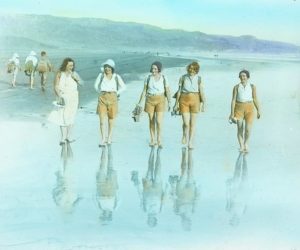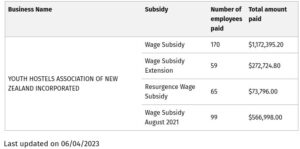1932: Youth Hostel Association of New Zealand
April 8, 2023
By AHNZ
 Today in New Zealand history, 8 April, 1932¹, a meeting of 9 Canterbury tramping organisations resolved to create the Youth Hostel Association of New Zealand (YHA.) It provided accommodation for young people exploring nature. The same spirit and organisation was preceded in England, Wales, Scotland, and Northern Ireland months before. This demonstrates once again that New Zealand is a Cultural Colony. Our YHA was the first in the Southern Hemisphere and endured some 90 years before succumbing to something similar to Conquest’s Law.
Today in New Zealand history, 8 April, 1932¹, a meeting of 9 Canterbury tramping organisations resolved to create the Youth Hostel Association of New Zealand (YHA.) It provided accommodation for young people exploring nature. The same spirit and organisation was preceded in England, Wales, Scotland, and Northern Ireland months before. This demonstrates once again that New Zealand is a Cultural Colony. Our YHA was the first in the Southern Hemisphere and endured some 90 years before succumbing to something similar to Conquest’s Law.
Robert Conquest said: Any organisation not explicitly right-wing sooner or later becomes left-wing. A variation on this statement is that any organisation not explicitly dedicated to its own integrity sooner or later becomes worth more dead than alive. After 90 years entropy set in, YHA lost its moral compass, and was plundered from within using the excuse of Labour 6.0’s COVID Pandemic. But that’s not how things were back at the beginning.
 There was a new and exciting generation in the 1930s with an urge to explore the outdoors. Many clubs and associations, even associations of associations, were formed and are still going in New Zealand today that date back to this cultural movement. This Pheonix Generation included literary figures like Allen Curnow and Elsie Locke who bemused their parents by tramping and camping in the New Zealand bush. The youth were captured by dreams of getting into the wild blue yonder and none more so than Jean Batten. Future historian and political operator, Bill Sutch, first hit news headlines in April 1933 when he and his party were lost attempting the Tararua Ranges in winter. The new New Zealanders also went alpine: “The new generation were climbing for climbing’s sake, for the challenge, the achievement and the fun.”; The Mountains of Erewhon, (1978)
There was a new and exciting generation in the 1930s with an urge to explore the outdoors. Many clubs and associations, even associations of associations, were formed and are still going in New Zealand today that date back to this cultural movement. This Pheonix Generation included literary figures like Allen Curnow and Elsie Locke who bemused their parents by tramping and camping in the New Zealand bush. The youth were captured by dreams of getting into the wild blue yonder and none more so than Jean Batten. Future historian and political operator, Bill Sutch, first hit news headlines in April 1933 when he and his party were lost attempting the Tararua Ranges in winter. The new New Zealanders also went alpine: “The new generation were climbing for climbing’s sake, for the challenge, the achievement and the fun.”; The Mountains of Erewhon, (1978)
The parents and grandparents of this Artist Generation accommodated them, for example names well known to students of New Zealand history: Cora Wilding, Arthur Dudley Dobson, Heaton Rhodes, Arnold Wall, and Macmillan Brown. They formed the Youth Hostel Association of New Zealand (YHA.)
Members and volunteers put in their own time, effort, and money to build Youth Hostels around the country. This created numerous bases so young people could easily access the great outdoors and explore the wilds of New Zealand. A new Romantic movement was spreading. By 1935 YHA had 27 hostels, still just in the South Island, and was still growing.
‘First ones in the Southern Hemisphere were those of the Youth Hostel Association of New Zealand…a meeting of 9 Canterbury tramping organisations, brought together by the [Sunlight] League and chaired by Sir Arthur Dudley Dobson. Sir Arthur was elected as President and vice-presidents included Sir Heaton Rhodes and Professors Arnold Wall and Macmillan Brown.’ wiki, and see also YHA.co.nz
“NEW ZEALANDERS are awakening 1 more and more to the joy and benefit to be derived from tramping; setting forth not merely for one day, but for several days on end. The Youth Hostel Association overseas arranges for shelter and food at very low rates for its accredited members, regardless of age, class or nationality, although primarily it is intended for young people who often have slender purses. ” – The Christchurch Star (1932,) Papers Past
By the 2010s YHA had, unfortunately, transmuted into something else. What started as a community became a network. The YHA had a rich portfolio of assets in prime locations situated close to New Zealand’s natural environment and they were ripe for take-over and plundering.
Demise of the YHA
 By 2018 the YHA National Board was in the hands of directors who were not themselves members of YHA except in the technical sense. An aggressive co-option program grabbed control of that independent YHA members making up the Association and control was vested centrally with the National Office. As it did so, the control of information was also with the National Office in Christchurch. Branches and member groups were cut out. A small group of outsiders were now the controllers, if not the legitimate inheritors, of one of New Zealand’s great legacy institutions. And, in particular, now had the power to dispose of many millions of dollars of commercial property.
By 2018 the YHA National Board was in the hands of directors who were not themselves members of YHA except in the technical sense. An aggressive co-option program grabbed control of that independent YHA members making up the Association and control was vested centrally with the National Office. As it did so, the control of information was also with the National Office in Christchurch. Branches and member groups were cut out. A small group of outsiders were now the controllers, if not the legitimate inheritors, of one of New Zealand’s great legacy institutions. And, in particular, now had the power to dispose of many millions of dollars of commercial property.
The YHA founders were all dead, of course. The next great inheritor generation in the 1960s/70s were also aging out so there were not enough members to keep the spirit alive. These corporate raider types were trained with the management, legal, media, political, and accounting skills to liquidate. To them it was just business and moral conscience didn’t come into it. Aging trampers lacked the specialist skills to out-maneuver full-time ‘Linked-In’ Mafia who had identified their heritage treasures as assets to be liquidated.
As Mark Ebrey observed in 2018 the same abattoir ethics had made successful grabs all over New Zealand. “All over the country, organisations are losing touch with their stakeholders. The Plunket Society recently taking over local branch funds is just one example of organisations increasingly riding roughshod over the people who support them. St John did the same late last year, by disbanding its Ohura branch committee and taking over its bank account. The account was said to contain hundreds of thousands of dollars raised by the branch.” He might also have mentioned Scouting New Zealand or even slow digesting of the brand that was Ernest Adams. Ref. Spirit, Ghost, Memory, History, Legend, Myth, AHNZ
Or, come to that, the seizure and corporatisation of the National Treaty Grounds. Ref. 1934: First Waitangi Day, AHNZ
 Opoutere YHA, at the Coromandel, was a survivor of the old nature experience YHA of old. Preferring the ‘flashpacker’ money-bags international backpacker market the new YHA Board got rid of Opoutere right out from under protesting members. It did so by out-voting them easily and threatening to expel the advocate who was “disrespectful” enough to protest!
Opoutere YHA, at the Coromandel, was a survivor of the old nature experience YHA of old. Preferring the ‘flashpacker’ money-bags international backpacker market the new YHA Board got rid of Opoutere right out from under protesting members. It did so by out-voting them easily and threatening to expel the advocate who was “disrespectful” enough to protest!
YHA moved quickly after that, closing and selling YHA Auckland City in 2021. The same year they sold off 4 others (YHA Rotorua, YHA Wellington, YHA Lake Tekapo, and YHA Wanaka) and leased them back from RPZ Ltd. who must have paid something like $50,000,000. All I can find out about RPZ is what the YHA realtor wants us to know: “RPZ bought the four properties as a long-term passive investment because it specifically wanted to partner with YHA but does not usually invest in hospitality.” RPZ do not exist on the New Zealand companies register. The respective council databases say “Owners are not publicly available.”
Whoever RNZ Ltd. are they must be very close to the YHA Board though because in early 2022 this “long-term” secret investor let YHA sell the properties again along with 5 others! The Labour 6.0 COVID Panic used used as the excuse for the further liquidation yet YHA’s board were only continuing a liquidation process already underway.
Nor did it matter that the YHA accommodations were bringing in more domestic revenue at double the usual. An institution that started out as being by New Zealanders for New Zealanders had accidentally returned to its roots. Well, we couldn’t have that! YHA was out for the international tourist dollar now so promptly shut down.
Not, mind you, before drawing $2,086,000 of taxpayer money for nothing thanks to Labour 6.0’s COVID Subsidy (see image, left.) Yet according to the YHA Annual Report the sum was $567,698 so who do you believe? The majority of some 170 employees lost their jobs at YHA at Christmas 2021.
The mass December 2022 sell-off to yet another secret investor due to “COVID woes” led quite quickly to YHA Lake Tekapo re-opening in December 2022. Right away it was at or close to full capacity and expanding to meet anticipated demand! Sounds like the foreigners YHA sold out to got a bargain for their bucks doesn’t it?
“In recent years the national board has carried out an aggressive co-option programme, to create a board that now has only one member who could truly be said to be a YHA member in the traditional sense. He was elected last year amid growing member concerns. At the same time, they have closed or sold all of the hostels that are not in main cities or tourist towns like Queenstown and Wanaka – effectively turning YHA into just another “flashpacker” chain.” – The YHA was set up by volunteer members. Now it’s refusing to listen to them, The Spinoff (2018)
“With a significant shift towards budget domestic travelers and family groups, the company were able to double their domestic bed nights during the Pandemic. However, the YHA National Board said that this was not enough to offset the loss of international backpackers for almost two years.” – YHA New Zealand closes all hostels after 90 years, NZ Herald (November 2021)
“The sell-off of nine closed youth hostel operations around New Zealand is under way…Colliers International said on Wednesday the Youth Hostel Association (YHA) hostels…are being sold because of financial woes as a result of Covid-19…“Overseas buyers know the calibre of these facilities and see it as a great opportunity to enter the New Zealand market”” – Sale of nine closed YHA hostels proceeding, Stuff (February 2022)
“A key accommodation facility in the Mackenzie has reopened after being mothballed in the midst of the Covid-19 pandemic and is already running close to capacity, with another set to open soon.” – $9m Lake Tekapo youth hostel ‘close to full’ weeks after reopening, Stuff (December 2022)
“The changes in the last year mean that YHA New Zealand no longer owns or directly manages any hostels in our network,..” – YHA Annual Report (2022)
“Board Members as at 30 June 2022: Ian Lothian, Nancy Ward, Hayley Groves, Darin Cusack, Rachael Shadbolt, Maureen McCloy, Mark Ebrey, Harry Guitry, James Bishop” – ibid
“Engaging our large membership base with matters of governance is an ongoing challenge.” – ibid
“Just as Covid-19 had an impact on our hostel network, it also had a considerable impact on our staff. When we announced that our owned hostels would close their doors to guests in December 2021, this also meant that our entire staff would lose their jobs. ” – ibid
Our trusted YHA caretakers tell us that they had to sell off these heritage assets to secret foreign buyers because the business was dying and there were debts to pay.
I wonder about those debts. If times were tough and they were going broke why did they go Woke? Why the ‘Green Footprint Project’ carbon credit caper? Why were YHA leading the way in creating electric vehicle charging stations? Is it possible that whoever benefited from the board’s decision to take on those debts and pay them out by selling off the YHA was the real reason for all of this heritage laundering in the first place? That would be the job for paid historians or journalists to investigate….if New Zealand still had any of those!
I wonder, too, about old trampers who think the now sold-out YHA is the same YHA they fondly remember. They haven’t read this AHNZ post. There never was a memo. There’s little or no reporting on this matter for them to have read. They should revise their last will and testament! Many of them might have bequeathed tens of thousands of dollars to the old Kiwi YHA they were fondly a part of. But do they know that they are now giving away money to these carpet-bagging board members who have liquidated the YHA, sold it to secret offshore investors, and are using the cash to finance Woke projects of their own selection?
“We express our heartfelt appreciation to those who have left us a gift in their will…The estate of Peggy Jack provided $100,000 this year.” – YHA Annual Report (2022)
New Zealand’s Pheonix Generation (aka ‘Silent Generation) are all but gone now. According to Strauss-Howe generational theory the ‘Artist’ role is now being taken up by Generation Z. So, we might anticipate a new round of young people excited to explore the natural environment vigorously. It’s a shame they will not be able to inherit and build on what past Kiwis did but will have to start all over again. Then again, perhaps that’s the way it should be. When the new urge to explore comes nobody will be able to stop them and they’ll find a way to creating new institutions to equal or surpass this one we’ve lost.
—
1. Welcome to New Zealand’s YHA Hostels. YHANZ. 1983. p. 39; Wikipedia
Image ref. Legacy YHANZ logo reconstructed by AHNZ (2023)
Image ref. YOUTH HOSTELS ASSOCIATION OF NEW ZEALAND INCORPORATED drawings from Labour 6.0 COVID Subsidy pay-outs. Ref. COVID-19 wage subsidies – Employer Search, workandincome.govt.nz
2 thoughts on "1932: Youth Hostel Association of New Zealand"
Leave a Reply
 Like Comment Share
Like Comment Share






This type of rotten behaviour has to been been allowed by govts and fostered at school level. Ethics need to be taught at every level and backed by discipline. Am just seething at how these trusting kiwis have been shafted by their countrymen (and women).
Well if we don’t learn ethics from this history then we’ll learn it the hard way through pain and loss. The moral here is Boundary Setting. True trampers should never have given away their treasure.